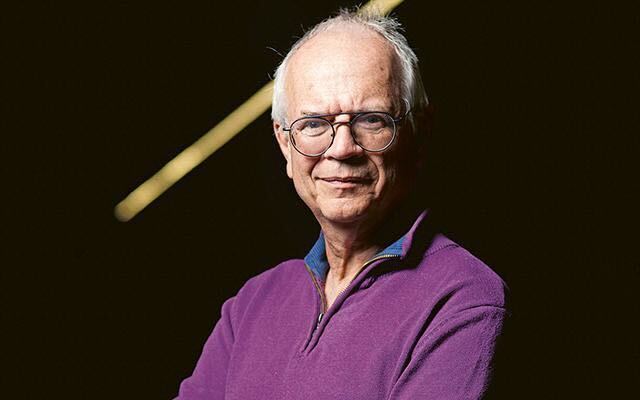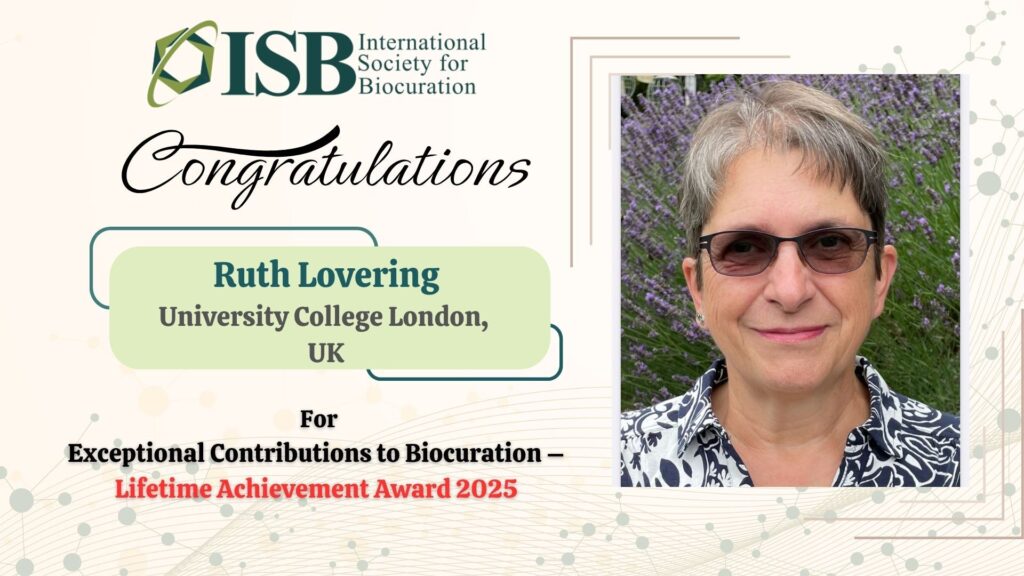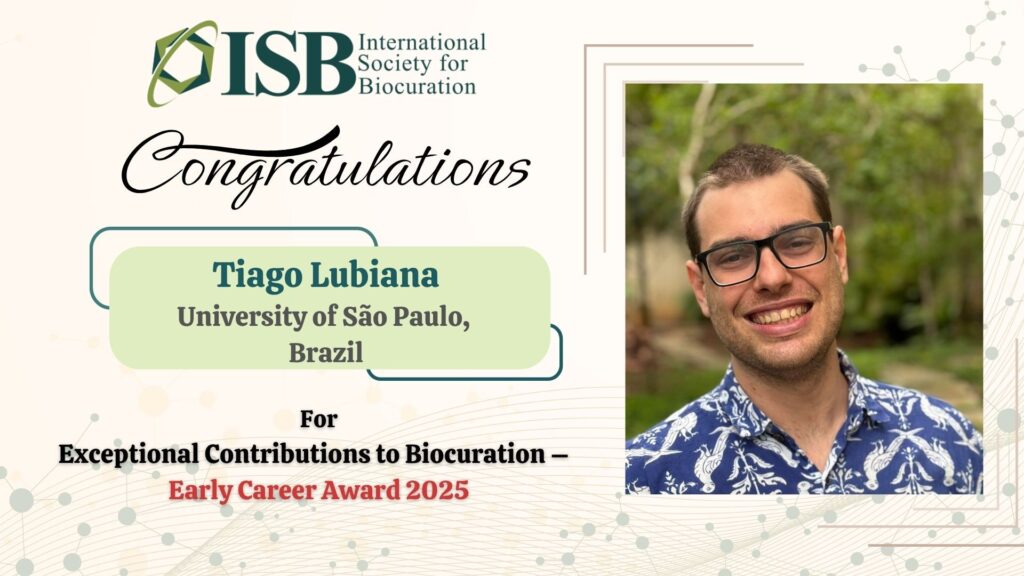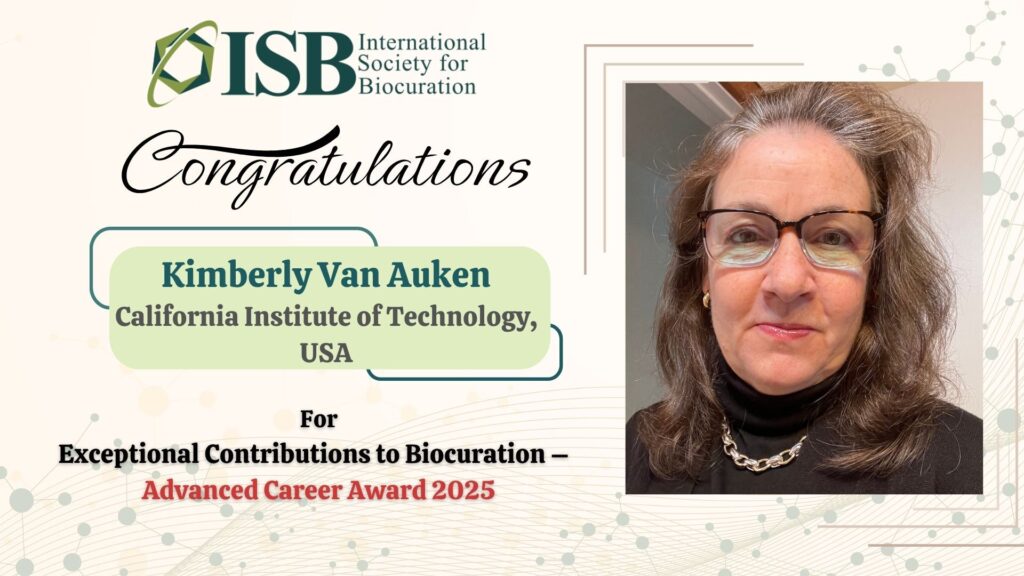The election of three members of the International Society for Biocuration Executive Committee (ISB EC) will be held from September 22nd – October 3rd, 2025.
Emails will be sent to current members on September 25th. Only current members, as of September 21st, 2025, who receive this email will be allowed to vote. Please note that if you are an ISB member and do not receive the email, please contact us at isb@biocurator.org.
We thank all of the following five candidates for agreeing to stand for election to the Executive Committee (EC). Information about the candidates standing for election to the Executive Committee (EC) is available below:
TBK Reddy
Position: Genomic Standards Group Lead
Affiliation: DOE Joint Genome Institute Lawrence Berkeley National Lab, Berkeley, CA, USA
Biosketch: Dr. T.B.K. Reddy has devoted more than 25 years to advancing the field of biocuration through leadership in the development and stewardship of internationally recognized biological databases. He began his career at The Jackson Laboratory, where he contributed to the Mouse Genome Database, one of the earliest and most influential model organism resources. He later directed curation efforts at the Tuberculosis Database (TBDB), integrating genomic and functional data to accelerate research on a critical global health challenge.
Since 2011, Dr. Reddy has led the Genomic Standards Group at the U.S. Department of Energy Joint Genome Institute (JGI), Lawrence Berkeley National Laboratory. In this role, he oversees the Genomes Online Database (GOLD), a flagship repository that provides curated metadata for genomes, metagenomes, and related projects worldwide. Under his guidance, GOLD has become a cornerstone for microbial genomics and microbiome research, setting benchmarks for data standards and interoperability.
Throughout his career, Dr. Reddy has championed the use of controlled vocabularies, metadata standards, and FAIR principles to ensure that curated data are accurate, discoverable, and reusable. He has co-authored numerous peer-reviewed papers, trained students and curators, and played an active role in the International Society for Biocuration community.
Motivation: I am motivated to serve on the ISB Executive Committee because I believe the future of biocuration depends on our ability to adapt quickly and stay relevant in an AI-centric scientific world. Over the past 25 years, I have led curation efforts at the Mouse Genome Database, the Tuberculosis Database, and now the Genomes Online Database (GOLD) at the DOE Joint Genome Institute. Across these projects, I have seen how curated metadata is not just infrastructure—it is the foundation that drives biological discovery. Today, AI and machine learning offer powerful opportunities, but their success depends on high-quality, standardized, and comprehensive metadata. If we continue with “business as usual,” we risk being left behind. I see ISB playing a critical role in preparing our community to respond to rapidly changing needs, from curating massive new datasets to adopting AI-assisted workflows that augment curator expertise.
On the Executive Committee, I will work to:
1) Position ISB at the forefront of AI-ready curation standards.
2) Expand community training that integrates both best practices and new tools.
3) Foster agility in ISB activities so we can meet emerging challenges and continue to accelerate discovery.
Kalpana Panneerselvam
Position: IntAct Team lead/Senior curator
Affiliation: EMBL-EBI, Hinxton, Cambridgeshire, UK
Biosketch: I began my biocuration career in 2009, working on projects involving the bioindexing of key terms from scientific publications. I then served as a curator for Ingenuity Variant Analysis (QIAGEN), where I focused on clinical variants and their associations with phenotypes, therapeutic interventions, population studies, and biomarkers relevant to clinical conditions and therapies.
Currently, I contribute to the IntAct database, specializing in the curation of molecular interaction data. My work emphasizes building contextual interactomes, including clinical contexts and tissue-specific interactions, as well as studying how clinical variants affect interactomes. I also curate detailed features such as binding domains involved in interactions, interaction kinetics, and the roles of inhibitors, agonists, and antagonists. In addition, I have been involved in mapping tissues and cell lines where interactions are detected into ontologies at their simplest context, with mappings shared to EFO for public access. I also contributed to the proposal for upgrading the XML-maker into a more user-friendly tool for generating IMEx-compliant high-throughput interaction data, ready for import into the curation pipeline.
Beyond curation, I have actively engaged in community outreach and training activities, particularly in the areas of molecular interaction network biology and data analysis.
Motivation: I see serving on the Executive Committee as an opportunity to give back to the community that has shaped my career, while working with colleagues to ensure that biocuration continues to grow as a recognized and valued discipline. I would be particularly interested in contributing to the committee’s efforts in coordinating micro-grant and fellowship submissions that support training and innovation in biocuration, as well as in preparing calls for hosting future Biocuration meetings to ensure global representation and inclusivity.
Susan Bello
Position: Senior Scientific Curator
Affiliation: Mouse Genome Informatics, The Jackson Laboratory, Bar Harbor, ME, USA
Biosketch: I have been a curator for Mouse Genome Informatics for over 20 years. While my research background was in oceanography and toxicology, I translated that experience into mouse phenotypes. I began by concentrating on curation of phenotypes and alleles developing an understanding of nomenclature standards and use of ontologies. Over time, I moved into work on ontology development for the Mammalian Phenotype, Human Disease, Vertebrate Trait, and UPheno ontologies. I’ve also been involved with website development, including the creation of the Human – Mouse: Disease Connection portal at MGI. With the advent of the Alliance of Genome Resources, I work as part of a team on the integration and harmonization of allele, phenotype, and disease curation across species. This project has included developing LinkML models to support curation needs across a wide range of species.
Motivation: I have been a member of the ISB since 2009 and have been on the ISB EC for the past 3 years, acting as chair of the EC for the past 2 years. On the EC, I have served on the Awards and Training & Outreach subcommittees throughout my tenure. On the Training & Outreach subcommittee, I’ve helped to identify additional groups of curators that could be brought into the ISB to expand our membership. I was part of the organizing committee for the 2025 Biocuration conference. I help to keep the ISB active on social media, especially on our Bluesky account. As chair I have worked to keep the many tasks of the EC progressing forward and to update procedures for the EC. I’ve also been involved with our interactions with the Global Biodata Coalition providing insights and feedback for their interactions with funders. In a second term on the EC, I hope to continue to increase the visibility of the work of biocurators, expand the membership of the ISB, and improve the broader communities understanding of the importance of and value added by the work of biocurators to hopefully increase support for biocuration.
Ranjana Kishore
Position: Biocurator, WormBase and Alliance of Genome Resources
Affiliation: Biology and Biological Engineering (BBE), California Institute of Technology, Pasadena, CA 91125
Biosketch: I am a biocuration scientist and life sciences professional with over 20 years of experience in the fields of biomedical curation and data management with an in-depth expertise in modeling, integration and display of biomedical data and automated methods of text summarization. I have contributed extensively and worked with widely used biomedical resources such as the Gene Ontology Consortium, WormBase, and groups such as EBI-EMBL and most recently with the Alliance of Genome Resources (Alliance). I have led several projects from conception to completion: biocuration of human models of disease for WormBase and automated text summarization of gene data that led to thousands of gene summaries for C. elegans and nine other nematode and parasitic species. More recently I led a similar effort at the Alliance which has resulted in thousands of gene summaries for nine major model organism species, now integrated into resources such as NCBI RefSeq, directly serving the broader scientific community. I will bring my experience working across diverse biocuration groups and multidisciplinary teams to the EC committee of the ISB to better achieve its goals.
Motivation: I am a biocuration scientist with over 20 years of experience in biomedical curation, data management, and integration of biological knowledge. What motivates me is the central role that biocuration plays in enabling discovery across the life sciences. I envision ISB as a hub for advancing both the science and the visibility of biocuration, particularly in this era of dwindling monetary funding and resources. I believe ISB can play a stronger role in fostering collaborations among diverse biocuration groups, promoting and sharing innovative methods and tools, and ensuring the sustainability and visibility of biocuration. Equally important, I will work to strengthen global partnerships, build relationships with user and publishing communities, improve documentation on standards and expand training and mentoring opportunities for early-career biocurators, with a strong commitment to equality, diversity, and inclusion. If elected to the ISB Executive Committee, I will work to increase interaction between biocurators by providing new forums for the exchange of ideas and experiences. I will bring to the EC not only my deep expertise and longstanding connections within the community, but also my strong communication skills—both written and spoken, extensive experience working in teams, and readiness to try new and bold ideas in order to fulfill and even enhance the goals of the ISB.




